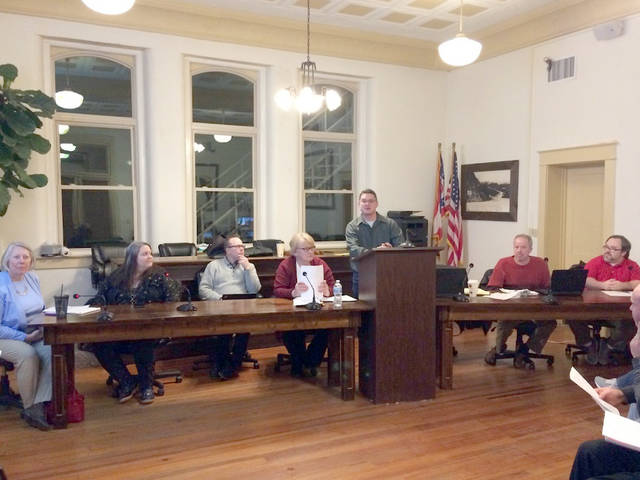By Nancy Montgomery
May 6, Garry Hunter, legal council for the Ohio Municipal League, spoke to a group in the Georgetown Village Council Chamber and over livestream about statutory and charter governments. The Ohio Municipal League is an organization that includes and represents both statutory and charter Ohio municipalities.
Mr. Hunter presented the pros and cons of both types of governments. He cited the cost of becoming a city in having to hire fulltime employees such as a mayor, engineer, solicitor, auditor and staff, treasurer, safety director, and service director as negatives of becoming a statutory city. A village charter can keep things the way they currently are with a part-time mayor and contracted engineer and solicitor and will continue that way after Georgetown becomes a city. Under the statutes, a city must have council members elected by wards in partisan elections. Under a charter, elections can still be non-partisan and councilmembers elected by the village as a whole as they are now. The citizens can keep what they like and change what they don’t like under a charter. Under the statutes, the state dictates what will be done. Mr. Hunter remarked that many of the statutes are out of date, such as the bidding process, and the legislature has not taken the time to update them. A charter can correct those areas.
In answer to a question about the fear of change, Mr. Hunter pointed out that the charter allows for the citizens to control the change. They can change as much or as little as they want. Georgetown being close to a population of 5000, Mr. Hunter said, “Georgetown is on the right timeline to adopt a village charter. I will tell you the form of the city government is vastly different than that of a village. You can wait until you become a city but you become a city in January of the year after you reach 5,000. Charter is a two-year process so you will be under city statutes for those 2 years. The employment requirements along for a statutory city will cost easily $200,000 to $300,000 a year. Under a charter, the village structures the government and its costs.”
Mr. Hunter pointed out that Georgetown can do nothing now and be 2 years behind or can go forward creating a charter commission and make the decision about adopting a charter after the census information is known. The real discussion comes after a document is created and mailed to every registered voter in the village. “I think Georgetown is doing it the right way. A lot of municipalities don’t do enough education and getting information out there. Georgetown is on the fence with which way it can go with the population. There is no real harm creating a commission to look into a charter. Most charter commissions are a broad sample of citizens so that everyone has a voice that is heard.” After the charter is drafted the voters can still vote it down.
Mr. Hunter’s final thought was “I don’t see Georgetown’s need for a dramatic change but if you become a city you will be in for a big change without a charter.” His suggestion was not to make big changes in a charter. Amendments can be made over time but to begin with he would do the basics. Whatever the charter doesn’t address the village would fall back on what the statutes say. Mr. Hunter commented that Georgetown already acts like a city with its population, owning its own utilities, and other ways things are handled. He complimented the village government for being forward-thinking.
The next Charter Forum will be June 4 at 7:00 PM in the Village Council Chamber. It will be conducted by the Ad Hoc Charter Committee and will be a question and answer session. It will also be livestreamed over Village of Georgetown Brown County Ohio on Facebook. If watching the livestream, viewers can ask questions on Facebook which will be monitored. Citizens can also submit questions over Facebook before the forum or email them to nmontgomery@georgetownohio.org or aclift@georgetownohio.org.



